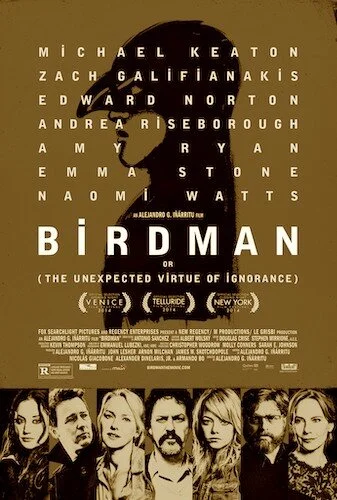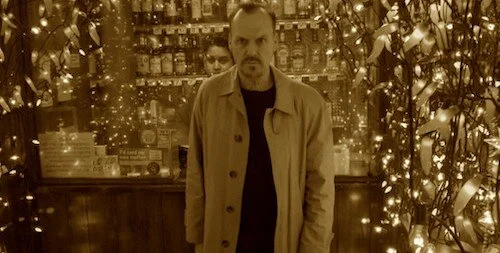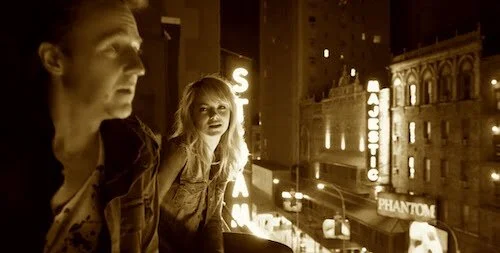Birdman or (The Unexpected Virtue of Ignorance)
This review is a part of the Best Picture Project: a review of every single Academy Award winner for the Best Picture category. Birdman or (The Unexpected Virtue of Ignorance) is the eighty seventh Best Picture winner at the 2014 Academy Awards.
As we know from Annie Hall and Shakespeare in Love, it takes a lot of gutsy moves and bold risks to get a comedy film to successfully win Best Picture at the Academy Awards nowadays (and I mean straight up comedies). As time goes on, the margin for what can win gets slimmer and slimmer. Not a single outright comedy won Best Picture in the 2000’s. The first three winners of the 2010’s didn’t qualify either. Then came Birdman or (The Unexpected Virtue of Ignorance), which dethroned Boyhood during its massive awards season run. Boyhood was expected to mostly sweep the Oscars that year; the film went home with one award for Patricia Arquette. Birdman dominated instead, winning for Picture, Director, Original Screenplay, and Cinematography.
Both of these competing films have staying power. Boyhood’s twelve year experiment still feels like a cinematic lifetime being lived in three hours. What surprises me more is how well Birdman has held up, and I couldn’t be more glad. It took an inventive-enough comedy to overtake a drama that took over a decade to shoot (I can easily see Boyhood winning in other years). So, what did Birdman have to do? Well, all it did was perfectly replicate the existential crises of a has-been trying to have a career rejuvenation. Alejandro G. Iñárritu took a story that could have been sappy and typical, and turned it into a mental theme park that explores all of these dizzying fears with the utmost capabilities (and hilarious disdain).
We follow Riggan Thomson and his disastrous debut as a Broadway star.
The film is shown in an illusionary “single shot” (for the most part), sublimely blending the lead character Riggan Thomson’s wish to find solace on a Broadway stage, and yet permanently being cursed by his film past. So, we don’t see cuts, like we were witnessing a play, but we do shatter the conventions of time and space (hours will pass if we duck behind a stage for one scene, for example), so the laws of cinema still prevail. This is especially prevalent as Thomson’s deepest admittances rise to the surface; at one point Birdman briefly becomes a CGI superhero fest, just like the film franchise Thomson is trying to leave behind. Hell, this very movie is called Birdman, not Riggan. Thomson was doomed from the start. The second part of the film’s title refers to the final review his play receives (possibly, if you believe the final moments actually happen, of course).
Yet, Iñárritu and company go one step further, and even cast very specific stars for each role in a hyper meta piece of commentary (despite whatever denials that have been implied in the past). Michael Keaton — a guy that lost the lustre of his glory days after being Batman for two films — plays an actor that was financially made but lost his career playing “Birdman”. Edward Norton plays a perfectionist that overtakes Thomson’s production, despite only being the star. Emma Stone is the misunderstood youth. Naomi Watts has had her talents wasted by bad films she’s been cast in. Zack Galifianakis can’t be taken seriously even when he means to take charge. Notice how I stopped reiterating that these are the characters in the film, and these labels still apply. All of the roles in Birdman are fine tuned for the people playing them, either because they have lived these lives, or because these roles symbolically represent these stars’ archetypes in a lot of their works.
Birdman also focuses on those close to Riggan Thomson, so all of their own self perpetuations get involved.
Even though we live Thomson’s day dreams, we still get sucked into the insecurities of all of the characters. Like a stage production, even the “background actors” matter, although we are behind Thomson the most. We spend so much time laughing at his misfortunes, that we don’t prepare for the film’s darker acts. We have ridiculed him, even in what could be his final hours. We are part of the problem. Then comes the part I consider a fragment of reality; the “Unexpected Virtue of Ignorance” portion of the film. Somehow, Thomson has survived the worst blow of blows. “Birdman” is still around. Thomson looks a little too much like his cinematic counterpart. The impossible happens. Everything feels starkly different; more optimistic. To me, none of this is real. The film ends when it “ends”. This is all just a hopeful dying wish. We can’t deny him of that, can we?
Iñárritu’s Birdman is unforgivingly savage, and for that we love it. As a comedy, it steps over so many barricades, and dares to go further (either in content, or in imagination). It is one of those works that only seems to work so well the way that it is. I don’t even know how Iñárritu got here. How do you craft such a fine-tuned idea with so many contextual complexities, metaphors, and successes? There doesn’t seem to be a possible middle path. What could square one have even looked like? Well, it takes a hell of a lot for a comedy to win Best Picture nowadays, but Birdman is the kind of proof that comedies can still go much further than some directors are willing to commit to.
Andreas Babiolakis has a Masters degree in Film and Photography Preservation and Collections Management from Ryerson University, as well as a Bachelors degree in Cinema Studies from York University. His favourite times of year are the Criterion Collection flash sales and the annual Toronto International Film Festival.







